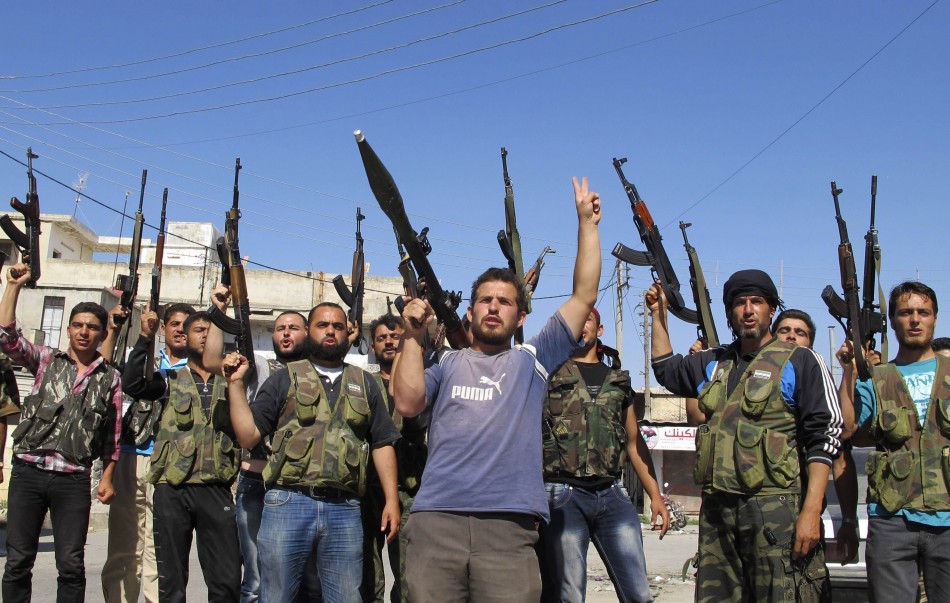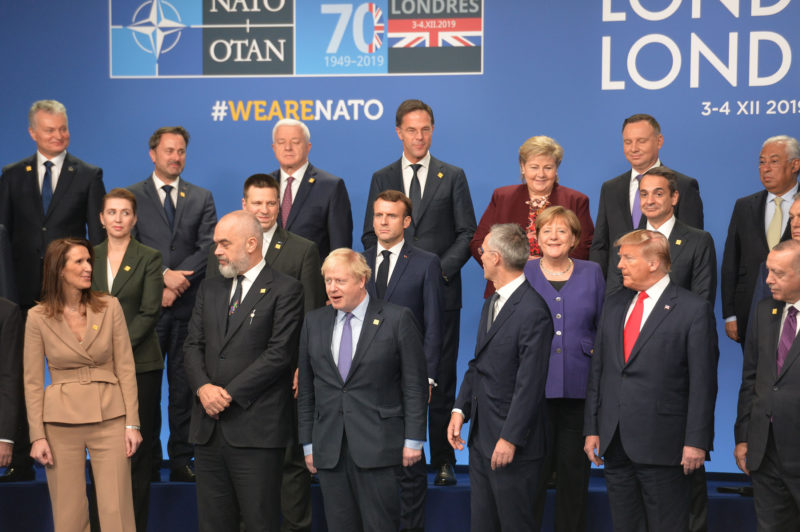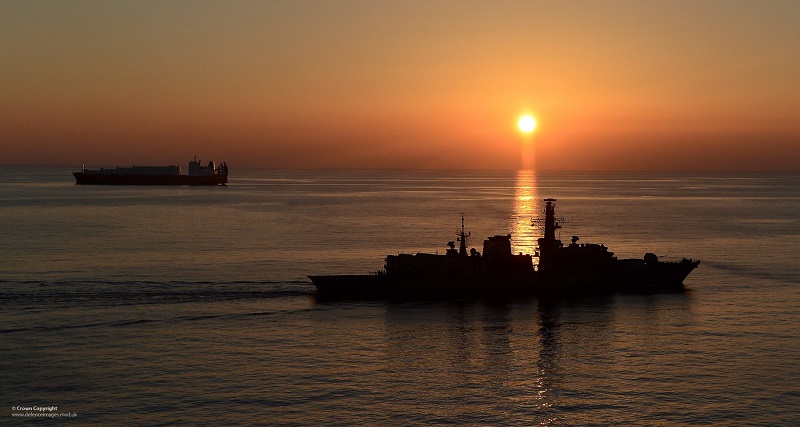Last month, Ahmad al Jarba, the leader of the Western-backed Syrian National Coalition (SNC), in a statement issued after meeting with US Secretary of State John Kerry, beseeched the US and other countries to supply the rebel forces with weapons as soon as possible. The rebels are losing ground. Al Jarba described the situation as desperate. The US has taken the brunt of the responsibility for Western backing of the SNC, with the Gulf States doing their part as well Considering NATO’s intervention in a Libya with characteristics very similar to Syria’s (a dictator violently suppressing dissent, with rebel groups in urgent need of outside help to be successful) why hasn’t NATO intervened in Syria?
An Assad victory in Syria’s conflict must be avoided: aside from allowing a brutal dictator to continue his rule, Iran would be emboldened and their increased power and influence could be used to fuel the operations of Hezbollah and Hamas in Iran’s proxy war with Israel. This would be devastating for the region’s stability, especially while the neighbouring countries of Turkey and Jordan struggle with massive numbers of Syrian refugees. Iran would dominate the Levant, and through its Syrian connection would gain access to the Mediterranean—where Russia’s naval base is located in Tartus. On the other hand, if the opposition in Syria does not consolidate its power in the aftermath of a victory over Assad, extremist factions of the rebel groups like Jabhat al-Nusra and the Islamic State of Iraq and the Levant will continue to destabilize the country. Even without extending far from its borders Syria has become a seedbed of menace to NATO’s member states. Clearly NATO has a security interest in the conflict, but does it have a legal mandate to intervene?
NATO was formed in 1949 to defend the North Atlantic area—to promote stability and protect the freedom of its member nations. Syria is not in the North Atlantic area, nor has it directly threatened any member state of NATO to an extent that would warrant an armed response (it has had minor border skirmishes with Turkey). But there are other factors to consider.
The new Strategic Concept adopted in November 2010 commits NATO “to prevent crises, manage conflicts and stabilize post-conflict situations.” Article 2 commits NATO “to the principles of individual liberty, democracy, human rights and the rule of law.” Article 4b commits NATO to use its political and military capabilities “to help manage developing crises that have the potential to affect Alliance security, to stop ongoing conflicts where they affect Alliance security; and to help consolidate stability in post-conflict situations where that contributes to Euro-Atlantic security. Article 11 acknowledges “Instability or conflict beyond NATO borders can directly threaten Alliance security, including by fostering extremism, terrorism, and trans-national illegal activities such as trafficking in arms, narcotics, and people.” The section “Security through Crisis Management” lays out NATO’s framework for involvement in crises and conflicts outside its borders.
The Strategic Concept makes clear that NATO’s involvement in crises and conflicts outside its borders is dependent on the potential of those crises and conflicts to threaten NATO’s security. There are two possible outcomes in Syria that will threaten the security of the North Atlantic community: if Assad remains in power, or if the Syrian opposition is able to remove Assad but is unable to establish an effective government. If Syrian opposition forces do not receive military assistance soon, then chances are that Assad will survive and an emboldened Iran will become the puppet master of a region hostile to the West. If the rebels are able to remove Assad, but the country becomes a haven for al Qaeda, Hezbollah and other extremists, then NATO member states will be on constant alert against terrorist attacks launched from a Syria mired in perpetual conflict.
In the face of this, NATO’s non-intervention might be puzzling. Read this article where I explain the complications behind a NATO intervention. Crucially, however, the reason NATO has not intervened is that it does not have the support of a UN Security Council (UNSC) resolution. Article 2 of NATO’s Core Tasks and Principles confirms that the Alliance is “firmly committed to the purposes and principles of the Charter of the United Nations,” and “affirms the primary responsibility of the Security Council for the maintenance of international peace and security.”
NATO has always preferred to engage in operations outside its borders with the full backing of the UN. NATO operations in the Western Balkans, Afghanistan, Iraq and Libya were all carried out in support of Security Council resolutions. In the case of Syria, however, the five veto-holding permanent members of the Security Council are divided, with Russia and China blocking UN resolutions that would permit NATO to intervene in Syria.
NATO Secretary General Anders Fogh Rasmussen has stated that, technically, NATO could intervene without the backing of a Security Council resolution if the intervention is founded on the principles of the UN Charter. But he also stressed to the Danish daily Politiken that he “does not advocate such…intervention since it is best to have [the] support of [a] Security Council resolution.” Only in the face of an imminent threat to North Atlantic security or something as extreme as genocide would NATO intervene against the wishes of the Security Council. Secretary General Rasmussen put it plainly back in March: “In Libya we took responsibility for the operation based on a United Nations mandate to protect the Libyan population against attacks from its own government … and we had active support from the countries in the region. None of these conditions are fulfilled in Syria, there is no United Nations mandate, there is no call on NATO to intervene in Syria, even the opposition in Syria does not ask for a foreign military intervention.”
It should be underscored that every member of NATO in effect holds veto-power over every resolution in that NATO can only act by consensus. It is not like the UN, where members must comply with UN Security Council resolutions. The political considerations surrounding Syrian intervention, specifically Russia’s involvement in the conflict, leads to some ambivalence regarding Syrian intervention. NATO has undertaken negotiations with Russia in an attempt to engender a more amicable NATO-Russia relationship, for example, involving Russia in plans to develop a shared ballistic missile defence system. For NATO to intervene in the Syrian conflict in direct opposition of Russia would undo the work already accomplished in that endeavour, and make virtually impossible progress in the near future. For this reason, many NATO member states are ambivalent about intervention. A UN Security Council resolution for intervention would do away with any ambivalence, but in the absence of one it is unsurprising that unified approval for Syrian intervention has not amounted.
This means that intervention in Syria, should it come about, will only take place outside the frameworks of NATO and the UN. There is pressure building for the creation of a no-fly zone, while the US is leading a Western campaign to supply the rebels with arms and training. But with Russia continuing to sell weapons to Assad, there is no guarantee that this will tilt the conflict in favour of the rebels. Without substantial military aid to the rebels the conflict will in time result in one of the two pernicious results described above. The day the North Atlantic states are forced to deal with the threat of a more powerful (and at some point possibly nuclear) Iran or an al Qaeda stronghold in Syria will be the day they regret not having acted when they had the chance—not to mention the tens of thousands of Syrian lives that will be lost in the months and years ahead. Sometimes countries have to shed the restrictive shackles of international treaties and act independently on the basis of what is right. As the conflict drags on, Syria is beginning to look like one of those times.




